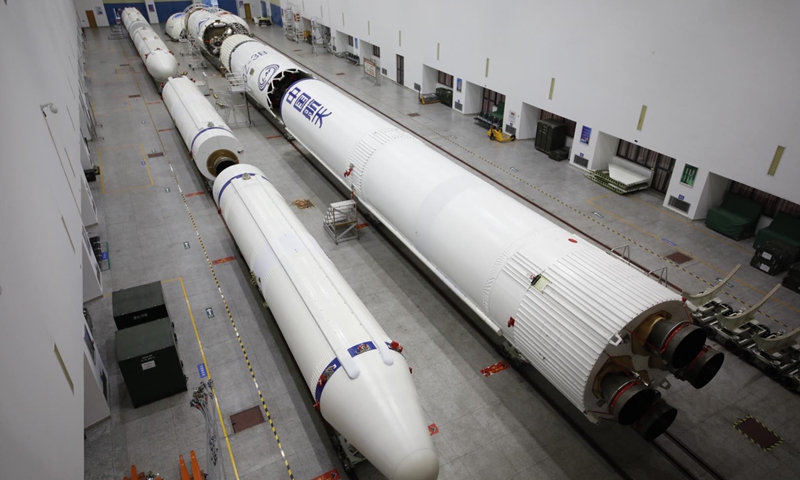China to realize smart rockets by 2025
Source: Global Times Published: 2020/10/22 14:57:14

The Long March-3B rocket stands by at the Xichang Satellite Launch Center in Southwest China's Sichuan Province with preparation work for the launch of the last BDS-3 satellite being smoothly underway. Photo: China Academy of Launch Vehicle
China is developing intelligent rockets with learning capabilities, with an R&D team working to enable China's main launch vehicles currently in service to have initial learning capabilities by 2025, Science and Technology Daily reported.
The application of intelligent technology to tasks such as navigation, guidance and control allows rockets to be more intelligent and autonomous, and have a stronger ability to actively adapt to complex environments and emergencies so as to ensure the more extensive completion of tasks, Science and Technology Daily learned from the Beijing Aerospace Automatic Control Institute Sunday.
According to research carried out by the Beijing Aerospace Automatic Control Institute, a rocket's flight control system, the equivalent to its "brain," has two major characteristics for learning.
The intelligent launch vehicle has the characteristic of learning while flying. Its control system can make full use of the rocket's multi-source information to enable the rocket to realize functions such as online identification of flight status and environment, online evaluation of carrying and control capabilities, online trajectory planning, online control reconstruction, and online target changing.
In other words, it can perceive its surrounding environment and change trajectory if it senses a threat. At the same time, the rocket can carry out self-diagnosis while in flight and evaluate its own ability, take corresponding measures according to the actual situation, or adjust the mission plan.
The flight strategies and trajectories of traditional rockets are designed in advance, and cannot be adjusted online when they encounter an unexpectedly complicated space environment during flight. In addition, if there is an emergency on the rocket, such as a power system failure, and no timely measures are taken, the mission is likely to fail, according to Yu Chunmei, deputy director of the Beijing Aerospace Automatic Control Institute.
Another characteristic is lifelong learning. Its control system can make full use of the data generated in its entire life cycle, based on big data and technologies including intelligent analysis, to realize the functions of intelligent establishment and correction of models, intelligent optimization of schemes and parameters, and continuous self-learning and improvement.
Most of China's launch vehicles currently in service are for one-time use, and can transmit their own "learning content" back to the ground during the flight for follow-up rockets to learn from, allowing for transitive learning between rockets.
China has made some progress in the exploration and application of technologies related to intelligent launch vehicles. The Beijing Aerospace Automatic Control Institute has begun working to improve China's launch vehicles now in service and popularize the learning capabilities.
On July 9 and October 12, 2020, China successfully launched the Long March-3B from the Xichang Satellite Launch Center. In addition to sending the satellite into the scheduled orbit for these two missions, the institute's research team also equipped the rocket with typical power failure identification and guidance and control reconstruction technology, successfully completing the flight test.
"It can be said that the Long March-3B has certain intelligent features," Yu Chunmei said. At present, only the algorithm has been modified for the improvement of the Long March-3B. More thorough improvement requires the addition of detection means on the rocket.
For the development of intelligent launch vehicles, the R&D team has formulated a "two-step" plan. The first is to give rockets strong adaptability in 2020, allowing them to be more adaptable in certain failure situations so that they can continue to fly.
The second is to strive to enable rockets to have learning ability by 2025.
In addition, the concept of intelligence will also be incorporated into China's development of launch vehicles.
According to official statistics, from 1990 to 2000, about 40% of launch vehicle failures in Europe, US, Japan, and Russia could have been remedied by advanced navigation guidance and control technology, allowing the mission to be completed or downgraded.
In recent years, both the Falcon 9 and Delta 4 launch vehicles have experienced in-flight engine thrust drop failures, but the implementation of remedial measures did not affect the main mission.
RELATED ARTICLES:
- Maiden flight of China’s new modified launch vehicle failed due to unknown malfunction
- China has successfully recycled a carrier rocket in a vertical landing test on Monday, a Chinese state key laboratory under the Chinese Academy of Launch Vehicle Technology announced.
- China eyes development of liquid hydrocarbon-powered reusable launch vehicles
Posted in: SOCIETY